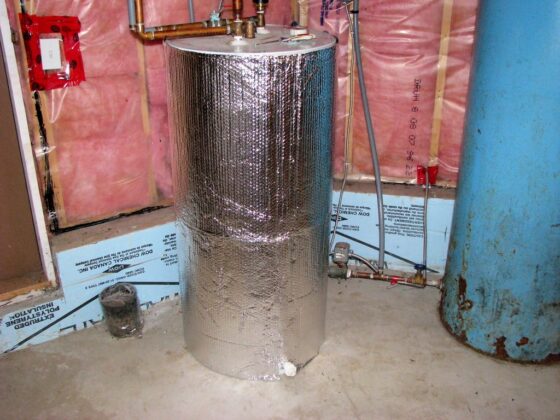Whether you’re a new homeowner or you’ve been around the block a few times, you might be wondering how long a water heater lasts. After all, it’s a significant investment for your home.
Table Of Contents
−- Average Lifespan of Water Heaters
- The Impact of Water Quality and Location on Lifespan
- Comparing Gas vs. Electric Water Heaters
- Signs It’s Time to Replace Your Water Heater
- Tips for Extending the Life of Your Water Heater
- Understanding the Costs of Replacement
- Is DIY Installation Safe?
- Benefits of Upgrading to Energy-Efficient Models
- Considering a Tankless Water Heater
- In Conclusion: Making the Right Choice
In this comprehensive guide, we’ll explore the lifespan of water heaters, factors affecting their longevity, tips for maintenance, and when to consider a replacement. Let’s dive right in!

Average Lifespan of Water Heaters
Most conventional water heaters, whether gas or electric, have a lifespan of approximately 8 to 12 years. However, this isn’t set in stone. With basic care and regular maintenance, you may even add an extra year or two to its life. Keep in mind that different types of water heaters may have varying lifespans:
- Standard Tank Storage: 8-12 years
- Tankless: 15-20 years
- Heat Pump: 10-15 years
The Impact of Water Quality and Location on Lifespan
Your water heater’s service life can be affected by factors like water quality and installation location. Hard water, which contains high mineral content, can cause sediment buildup and corrosion, potentially shortening the lifespan by 2-3 years. Similarly, water heaters installed in garages or crawl spaces with significant temperature fluctuations may experience more wear and tear.
Comparing Gas vs. Electric Water Heaters
While electric water heaters may last 1-2 years longer than gas-powered ones, gas water heaters are often considered more environmentally friendly and economical. Your choice between the two may depend on factors like energy costs, availability, and personal preferences.
Signs It’s Time to Replace Your Water Heater
Keep an eye out for these signs that suggest it may be time for a new water heater:
- Age: Water heaters over 10 years old should be considered for replacement.
- Discolored Water: Rusty or tinted hot water may indicate a corroded tank.
- Unusual Sounds: Gurgling or popping noises can signal sediment buildup.
- Dampness: Moisture or dampness around the tank may hint at a leak.
- Lack of Hot Water: An unexpected cold shower warrants a professional check.
- Puddles: Pools of water near the tank are a clear sign of a problem.
Tips for Extending the Life of Your Water Heater
Here are some maintenance tips to extend your water heater’s life:
- Flush the Tank: Flush the tank annually to remove sediment and prevent corrosion.
- Check the Anode Rod: Inspect and replace the anode rod as needed to prevent tank rust.
- Monitor the Temperature: Set the tank’s temperature at or below 140 degrees Fahrenheit.
- Install a Water Softener: If you have hard water, consider installing a water softener.
Understanding the Costs of Replacement
The cost of replacing a water heater varies depending on the type:
| Type | Average Unit Price Range | Installation Cost |
|---|---|---|
| Standard Tank Storage | $400 – $1,600 | $150 – $600 |
| Tankless | $250 – $2,500 | $400 – $1,500 |
| Heat Pump | $700 – $3,000 | $150 – $600 |
| Solar | $1,000 – $6,000 | $2,000 – $4,000 |
Is DIY Installation Safe?
While some jurisdictions allow homeowners to install their water heaters, it’s essential to pull a permit and adhere to safety codes. Improper installation can lead to injuries, property damage, and even fatalities. We recommend trusting seasoned plumbers to handle this task, ensuring the safety and longevity of your water heater.
Benefits of Upgrading to Energy-Efficient Models
Upgrading to an energy-efficient water heater comes with several perks:
- Cost Savings: Energy-efficient models can save you hundreds of dollars annually on utility bills.
- Eco-Friendly: These models have a lower environmental impact and reduce greenhouse gas emissions.
- Enhanced Performance: Many new models are 20% more efficient and heat water faster than older units.
- Insulation: Modern water heaters use foam insulation instead of fiberglass, improving heat retention.
Look for models with the Energy Star certification, indicating high energy efficiency. While they may cost more upfront, energy-efficient water heaters pay for themselves in utility savings over time.
Considering a Tankless Water Heater
Another option to consider is a tankless water heater. Unlike traditional tank models that store heated water, tankless units heat water on demand, providing continuous hot water. They’re space-saving, energy-efficient, and boast a longer lifespan (up to 20 years). However, they may have higher upfront and installation costs.
In Conclusion: Making the Right Choice
Choosing the right water heater is crucial for your comfort and budget. While conventional water heaters typically last 8-12 years, factors like maintenance, water quality, and usage patterns can influence their lifespan. By recognizing warning signs, performing routine maintenance, and selecting energy-efficient models, you can optimize your water heater’s performance and longevity.
Whether you’re leaning towards a tankless water heater or sticking with a traditional tank model, we hope this comprehensive guide has provided valuable insights to make an informed decision. Here’s to many years of warm showers and cozy baths!

Jay
Jay is a health and wellness enthusiast with expertise in water quality and nutrition. As a knowledgeable advocate for holistic well-being, Jay successfully manages Type 2 Diabetes through informed lifestyle choices. Committed to sharing reliable and authoritative insights, Jay combines firsthand experience with a passion for enhancing health."
